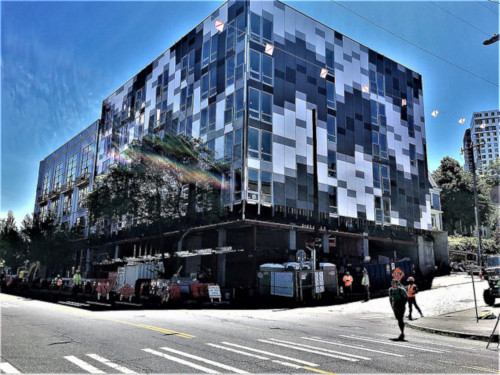SUBSCRIBE TO THE FREE NEWSLETTER
British Columbia looks at basic income
Basic income offers a fairly simple proposition: offer people a guaranteed income to support them if they lose a job, become disabled, or want to start a new business. British Columbia’s government formed a commission to study the possibility of starting a basic income plan in BC and has asked economist David Green and others to examine past and current studies
In a feature originally published at The Tyee and now online at Cascadia Magazine, Geoff Dembicki talks with several researchers about the pros and cons of giving everyone in the province (possibly below a certain income) a monthly check. Supporters say it offers stability in an economy where automation is replacing jobs and income inequality growing. Critics wonder about high costs and whether it’s truly effective. Green says he’s an “agnostic,” seeing both sides of the issue.
One common criticism that the studies appear to refute is the idea that guaranteed income would encourage people to stop working. Dembicki notes, “We can say with a fair degree of certainty that in the five basic income pilot projects conducted in the U.S. and Manitoba in the 1970s, as well as ongoing dividend programs in Alaska and Cherokee Nation territory, getting free cash didn’t result in people deciding not to work.”
Read the full article online at Cascadia Magazine here.
Have thoughts you’d like to share on basic income? Email Cascadia Daily here and let us know.
And thanks to The Tyee for allowing us to reprint Geoff’s article.
Cascadia Magazine original: All the Elements at Play
Portland-based writer Jason Arias has a very funny essay now online at Cascadia Magazine, “All the Elements at Play” about a trip his family took to a safari game park on the Oregon coast. It’s got Pokemon, a chimp named George, and a lesson in karmic redemption. If nothing else, you’ll learn to pay attention when sign says “Do Not Taunt the Chimpanzee.” Read the full essay here.
Can Cascadia cities build on public land to help housing crisis?
The Evergrey has a great piece by Ana Sofia Knauf looking at ways Seattle could address high housing costs by making public land available for housing development. Meanwhile, at the Guardian, Shaun Scott points out the Microsoft’s publicity stunt loaning money to build housing is a hollow gesture that puts a spotlight on the real problem: we need serious tax revenue invested in affordable housing. A Portland area parks district is seriously looking at affordable housing on its land in light of a new housing bond. And the Seattle Times notes that people who can’t afford high rents in Seattle are flocking to the west side of Puget Sound. And Crosscut reports on a Seattle city council member’s fight to save the last affordable mobile home parks in the city.
BC’s Site C dam could be replaced with gas & renewables
Business Vancouver reports on a new study that finds the controversial Site C dam in north British Columbia could more cheaply be replaced with a combination of natural gas, wind, and other renewable energy sources, rather than the $10.7 billion estimated price tag for the project. In related energy news, CBC reports that BC has filed it final arguments in a challenge against the Trans Mountain pipeline, and the National Energy Board will make its recommendation on the future of the pipeline in late February.
Feds make take cheaper, quicker fix on Hanford waste
Anna King, reporting for OPB, looks at the US Department of Energy’s proposal to downgrade the status of the Hanford site’s 56 million gallons nuclear waste — possibly speeding the cleanup but posing serious questions over whether the waste will be stored a safe way for thousands of years.
Cascadia glaciers melting thanks to climate change
The Seattle Times has a detailed report on how the glaciers in Washington, Oregon, British Columbia, and northern California are rapidly losing ice thanks to anthropogenic climate change. Meanwhile, read Seattle climate scientist Sarah Myrhe’s remarks to a recent conference on climate action in Chile: “We as scientists must advocate for the value of life itself at this precarious moment.”
Company that owns Bend newspaper declares bankruptcy
OPB reports that the company that owns the Bulletin in Bend, Oregon announced it’s filing for bankruptcy, putting in crisis local news organizations throughout south-central Oregon and northern California.
Ijeoma Oluo on non-violence in a violent world
At the South Seattle Emerald, read Seattle writer Ijeoma Oluo’s speech at an event celebrating the legacy of Martin Luther King, Jr. in which she takes issue with the whitewashing of the MLK holiday in the US: “Dr. King’s commitment to nonviolence was not a commitment to passivity. It was a commitment to direct confrontation with the violence of oppression.”
Seattle poet Claudia Castro Luna’s call to action
Arts Washington reprints a poem Washington poet laureate Claudia Castro Luna wrote and read for the opening of the 2019 legislative session, which calls for empathy and action:
“We are equally susceptible to kindness
and to cold, and board together
the destiny of our shared country.”
Read the full poem here.
That’s this evening’s selection of news, arts, and culture from across the Pacific Northwest. –Andrew Engelson
Photo credit: Seattle apartment building by Joe Wolf via Flickr CC BY-SA 2.0

